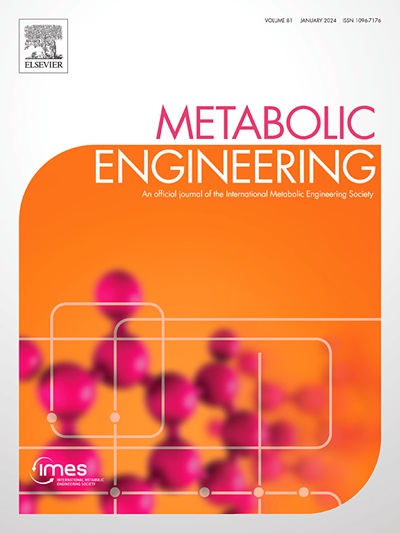Establishing Vibrio natriegens as a high-performance host for acetate-based poly-3-hydroxybutyrate production
IF 6.8
1区 生物学
Q1 BIOTECHNOLOGY & APPLIED MICROBIOLOGY
引用次数: 0
Abstract
Acetate can be a sustainable and renewable carbon source that holds significant promise for biotechnological production but is underutilized industrially due to limited microbial efficiency. Vibrio natriegens, recognized for exceptionally fast growth rates, represents a compelling host for developing efficient acetate-based bioprocesses. In this study, adaptive laboratory evolution significantly enhanced V. natriegens’ ability to grow on acetate as the sole carbon source, achieving an 89 % increase in growth rate. Genetic and transcriptomic analyses revealed key adaptations improving acetate uptake and metabolism via increased salt tolerance, boosted Pta/AckA pathway activity, and rewired quorum sensing. Further metabolic engineering and bioprocess optimization enabled the evolved strain to reach high cell densities and efficiently convert acetate into the bioplastic poly-3-hydroxybutyrate (PHB), with productivities up to 0.27 g/L/h and PHB accumulation reaching 45.66 % of cell biomass. These advances position V. natriegens as a highly promising microbial platform for sustainable, scalable, and cost-effective biomanufacturing using acetate as a green feedstock.

建立营养弧菌作为高效宿主生产基于醋酸酯的聚3-羟基丁酸酯
醋酸盐是一种可持续和可再生的碳源,在生物技术生产中具有重要的前景,但由于微生物效率有限,在工业上未得到充分利用。营养弧菌以其异常快速的生长速度而闻名,是开发高效的基于醋酸盐的生物过程的令人信服的宿主。在本研究中,适应性实验室进化显著增强了V. natrigens以醋酸盐为唯一碳源的生长能力,其生长速率提高了89%。遗传和转录组学分析表明,通过提高耐盐性,提高Pta/AckA途径活性,以及重新连接群体感应来改善醋酸盐摄取和代谢。进一步的代谢工程和生物工艺优化使进化菌株达到较高的细胞密度,并有效地将乙酸转化为生物塑料聚3-羟基丁酸酯(PHB),其产量高达0.27 g/L/h, PHB积累量达到细胞生物量的45.66%。这些进展使V. natriegens成为一个非常有前途的微生物平台,可以使用醋酸盐作为绿色原料进行可持续、可扩展和具有成本效益的生物制造。
本文章由计算机程序翻译,如有差异,请以英文原文为准。
求助全文
约1分钟内获得全文
求助全文
来源期刊

Metabolic engineering
工程技术-生物工程与应用微生物
CiteScore
15.60
自引率
6.00%
发文量
140
审稿时长
44 days
期刊介绍:
Metabolic Engineering (MBE) is a journal that focuses on publishing original research papers on the directed modulation of metabolic pathways for metabolite overproduction or the enhancement of cellular properties. It welcomes papers that describe the engineering of native pathways and the synthesis of heterologous pathways to convert microorganisms into microbial cell factories. The journal covers experimental, computational, and modeling approaches for understanding metabolic pathways and manipulating them through genetic, media, or environmental means. Effective exploration of metabolic pathways necessitates the use of molecular biology and biochemistry methods, as well as engineering techniques for modeling and data analysis. MBE serves as a platform for interdisciplinary research in fields such as biochemistry, molecular biology, applied microbiology, cellular physiology, cellular nutrition in health and disease, and biochemical engineering. The journal publishes various types of papers, including original research papers and review papers. It is indexed and abstracted in databases such as Scopus, Embase, EMBiology, Current Contents - Life Sciences and Clinical Medicine, Science Citation Index, PubMed/Medline, CAS and Biotechnology Citation Index.
 求助内容:
求助内容: 应助结果提醒方式:
应助结果提醒方式:


